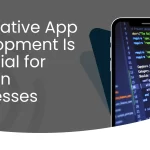Best Mobile App Development Company For You
Mobile apps are a must for businesses and everyday life, facilitating effective audience interaction. The selection of development approach—native, hybrid, or cross-platform—is important. Each has advantages and disadvantages, affecting business objectives, cost, and market suitability. This article discusses these approaches to assist you in selecting the best one. A best mobile app development company understands these differences and helps businesses choose the right strategy. By evaluating your goals, budget, and scalability needs, you can find the ideal development approach for long-term success.
Types of Best Mobile App Development Company
Choosing the best mobile app development company is the most important step in creating a high-quality and scalable app. Company specialize in native, hybrid, cross-platform, enterprise each with its own advantages. Knowing these types enables businesses to select the best partner depending on their objectives, budget, and needs. This guide discusses the various types of mobile app development companies and their strengths to enable you to make the right choice.
1. Native App Development
A best mobile app development company specializes in native app development, creating applications for a single platform, iOS or Android, using languages like Swift, Objective-C, Kotlin, or Java. These apps provide optimal performance, user experience, and access to hardware features like the camera, GPS, and sensors. However, development can be costly and time-consuming due to separate coding for each platform. Despite this, native apps are ideal for high-performance, secure applications requiring deep hardware integration. Examples include Instagram for its smooth experience and WhatsApp for its speed and security.
2. Hybrid App Development
A best mobile app development company builds hybrid apps using web technologies like HTML, CSS, and JavaScript, wrapped in a native shell. These apps run on multiple platforms with a single codebase, making them more affordable and faster to develop than native apps. Hybrid apps balance cost and functionality but may lack the quality and device access of native apps. They suit content-driven platforms like news apps and blogs but are less ideal for high-performance applications.
3. Cross-Platform App Development
A best mobile app development company uses cross-platform development to create a single codebase for both Android and iOS. Frameworks like Flutter and React Native enable apps to mimic native performance while reducing development time and cost. This approach is ideal for businesses aiming for a quick launch without investing in separate native apps. While cross-platform apps may be slightly slower and have limited access to high-end device features, they offer a balance of performance and efficiency. Examples include Facebook, using React Native for smooth functionality, and Airbnb, which adopted it to modernize app development.
Important Factors- When Selecting the Best Mobile App Development Company
When selecting a mobile app development strategy, businesses must consider several factors. A best mobile app development company helps determine whether an iOS app, Android app, or both are needed and whether to build a full-fledged product. High-performance apps are best developed natively, while cross-platform and hybrid options reduce costs and time. Platform compatibility is key for targeting both iOS and Android users. Cost and time of development are also critical, with native development requiring more money and time compared to cross-platform and hybrid strategies that can lower costs and reduce time to market. Maintenance and scalability also matter, as cross-platform apps are easier to maintain, while native apps offer better long-term scalability. To know more about us, visit our portfolio.

Best Mobile App Development Approach for Different Business Needs
The best mobile app development strategy varies with the particular requirements of the business. Startups and businesses are tend to thrive with cross-platform development based on frameworks such as Flutter or React Native since these enable rapid deployment at reduced cost. Enterprise apps that demand high security and seamless integration with in-house systems usually work best with native development. E-commerce apps, which need seamless performance and an enhanced user experience, can be served equally well by either native development based on their budget and needs. By taking into account the specific needs of each business model, organizations can select the most appropriate app development methodology.
Conclusion
Selecting the ideal mobile application development approach is based on different factors such as price, performance specifications, and audience. Native applications offer optimum performance, security, and user experience but are more expensive and take longer to develop. Hybrid apps offer economical ease with a shared codebase but less performance than native applications. Cross-platform development is a balance between functionality and efficiency and is perfect for startups and companies that need rapid market entry. With through assessment of business objectives and technical specifications, businesses can make an educated choice and pick the app development method best suited to their requirements.










